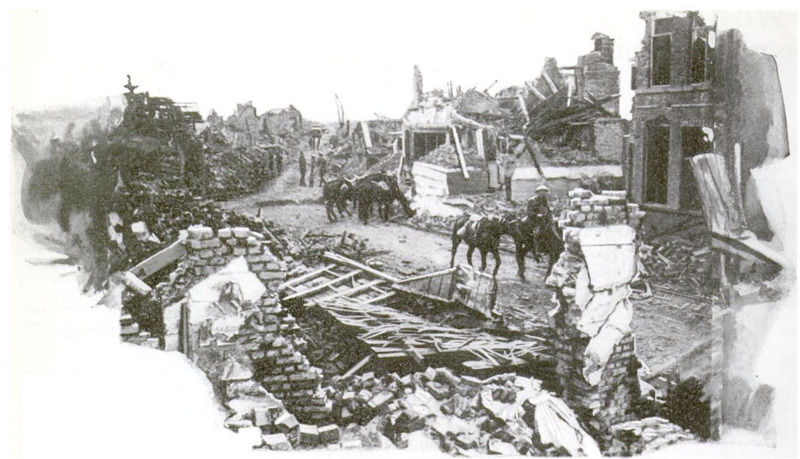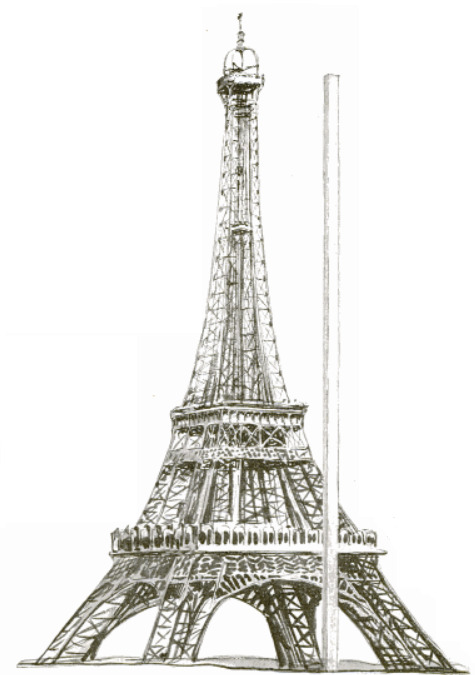-
Titolo
-
The opportunities for the growth of American economy after the end of World War I
-
Article Title and/or Image Caption
-
What Is Ahead of Us?
-
extracted text
-
DOES peace offer opportunity?
Will America do her best?
When do trees grow most luxu-
riantly, bud and shoot, leaf and
bloom? It is in the spring, after the
killing and destroying frosts of winter.
When are wild animals thinnest?
When do bears emerge, lean and gaunt,
from their lira? In the spring, after
the. exhausting and life-destroying
winter.
During the strain of winter both
plants and animals have used up their
surplus, and in the spring they must
joyously and energetically hustle.
‘When is man most hungry and when
does he lay on flesh most rapidly?
When he is recovering from an attack
of wasting fever.
Are these lessons to go unheeded?
The Worst Setback in History
The world has just received the
greatest material setback in all the
experience of history. More people
have perished, more property has been
destroyed, than in any other period
ten times as long.
Because there will be fewer people,
the world will be relatively bigger than
before. ‘The sun's warmth, the rain,
the soil's fertility, have not lessened.
1f human beings were trees or animals,
they would recover with great rapid"
ity; but we are human beings, and we
may fail to realize that a new era has
been born—born in travail, in agony,
in blood, but nevertheless a great new
era—and that it will take fifty years
under wise leadership with best counsel
and of greatest energy to catch up and
to consolidate.
Is there ground for sober optimism?
Yes, if we hold on to our fine qualities,
if we have broad and clear thinking
leadership, if we have experienced
stalls, if wo have intelligent, careful,
energetic workers in the line.
The finest words ever spoken as to
organization were those so briefly and
beautifully used by Marshal Foch
when he was thanking General Per-
shing. They contain all the truths
that we must apply if we are to
succeed in peace as we have succeeded
in war. 1 shall paraphrase for the
future what he said of the past:
“Complete success will come only
i all display fine qualities. We must
have breadth and clearness of concep-
tion in the leaders, we must have
abilities and methods in the staffs,
and wo must have consoloss energy
and indomitable courage in the men
in the line.”
The outlook is very favorable, the
opportunity is there.
America’s Wealth
(1) It will take the world three to
five years to build up the normal food
supply. Because the United States is
the greatest immediate purveyor of
food (Russia being for the present too
disorganized to count), the farmers
will receive very high prices not only
for grains, hogs, and cattle, but also
for cotton. The farmers will want
workers, and can pay the wages; and
having sold for much they will buy
much. Last year the farm products
of the United States aggregated in
value nearly $20,000,000,000.
(2) But the farmers are only a
group in the great class that creates
supplies by annexing what nature has
provided and what man desires. There
are our mines, our forests, our fisheries,
our waterfalls. Silver, copper, zinc,
lead, iron, gas and ofl and coal, coment,
lumber, electrical horsepower, all are
going fo be in great demand. Gold
alone has lost value.
(3 Our products are going to be in
demand because billions of property in
Europe has been destroyed and must
be replaced. They are going to be in
demand because we ourselves at home
have been falling behind. Owing to
the war, we have curtailed our own
improvements; they must now be
brought up.
(4) We are literally bursting with
surplus values in the United States,
and all the world needs these values.
(5) One quarter of the world's
shipping has been destroyed. To
recreate it will require materials,
equipment, and workers.
(6) Vast areas have been swept
bare of all the accumulations of
centuries of saving. All this must be
productively replaced.
(7) The existing industrial wastes
in the United States amount to
$50,000,000 a day. In a year this
amounts to more than our total
national debt. If we could save these
wastes we could pay off the whole
material cost of the war in two years.
Happy is the nation whose income is so
greatly above its needs that it can be
curtailed $50,000,000 a day without
reaching bed-rock.
These, therefore, are the five stimu-
lating conditions: food shortage, ship
shortage, devastated areas, the great
current wastes, the need for improve-
ment and betterments.
America’s physical conditions are
ideal. If there is any misgiving it is
due to what lies within us, not without.
We are wasteful. In the last four
years we have indulged in an orgy of
waste. It will be difficult to stop it.
‘We are provincial. We shall perhaps
not know how to finance our sales.
Wise Men Take Chances
One American had the big idea.
France wanted to buy of him, but had
no money. His friends tried to dis-
suade him from taking French bonds.
They feared that Germany would win;
they feared that, even if France won,
she could not pay.
“French bonds are good enough for
me,” he said, “and if France loses I
would lose both bonds and freedom.
But if France wins yet cannot pay, I
shall only be back to shirt-sleeves,
where I started.”
If we are wise we shall take a
chance. Take French and other bonds
of every kind guaranteed or at least
certified to by the respec-
tive governments, en-
dorsed or at least still
further certified to by our
Government—bonds ac-
cepted by banks and made
legal investments for sav-
ings funds, for insurance
reserves, and for fiduciary
investments. It is better
to have some loss than to
have the whole world stag-
nate.
Do I counsel reckless
ness? No. We have un-
fortunately been both con-
ceited and reckless. Any
tyro ought to know that
“cost plus profit” is no
proper basis for manufac-
turing. Our Government
was warned but would not
listen, and its inexpe-
rienced representatives
wasted $3,000,000,000 on
the cost plus profit in-
iquity. I counsel extreme hopeful-
ness coupled with extreme caution.
Wastefulness, provincialism, over-
confidence, are the faults of youth.
They are serious faults, but they are
not utterly destructive, as were the
German and the Russian faults.
Autocracy is leadership without
staff or line; bureaucracy is ability
and methods without either leader-
ship or line; Bolshevism is line without
either leadership or ability.
‘What we must have is the balanced
combination of all.
‘We have our minor problems.
Our Government in President and
Congress came nobly to the front.
An immense army was raised and sent
overseas, billions were secured and
spent, the end in view was achieved.
Nevertheless, there was inefficiency as
monumental as the enthusiasm.
Labor is uneasy. Some think that it
can find a class
solution without
reference to high
ideals, without need
of clear thinking
and broad concep-
tions, without staff
experience, wisdom,
and methods. The
fundamental as to
division of returns
is that part goes to
leaders, part to
staff, part to work-
ers, part to those
who furnish the
equipment, part to
those who furnish
the materials, and
part to those who
buy. No one class
can demand or at-
tempt to take an
unfair share with-
out stirring up a
hornet’s nest.
In return for wages, for materials,
for equipment service, whether high or
low, there should be a standard
equivalent in output for the time
used for the unit of material, for
the equipment service, and eaeh
should receive the fair reward for
his own contribution.
Wages Follow Price of Food
Wages have risen on account of
the rise in the cost of food. Wages
have always somewhat closely followed
the price of food. In the State of New
York from October, 1914, to October,
1918, wages on the average increased
81 per cent, but during the same
period the cost of food increased only
73 per cent. Clothing increased about
50 per cent, miscellaneous articles in-
creased 40 per cent, rent increased
from 15 to 20 per cent, and the cost of
service, from utility corpora- |
tions, is the same as before. |
But there has also been more
employment, so that, in spite
of the absentees in the war,
wages increased 123 per cent.
When food prices drop the |
world over, there may come
also a drop in wages, although |
it ought to be possible to miti-
gate this, if not wholly to
prevent it, by the double
remedy of waste elimination.
To hold our first place in the
world, either as big brother to
humanity or in competition, |
we must produce at lowest unit
cost,
If we have wise leadership,
competent counsel, rational
line workers, we shall be able
to combine lowest unit cost
with highest wage rates per |
hour, greatest number em- |
ployed and reasonable num- |
ber of hours.
But if wastes are not at- |
tacked, if methods are mot
improved, we will stagnate
while others take the world's
markets, and then we must
drop toward European stand-
ards of inefliciency and low-
priced labor.
Russia has been engulfed by |
Bolshevism; Germany has
been ruined by autocratic bu-
reaucracy. Even some of our
Allies may have trouble. But
i hope to see America lead in
the new peace evolution of
the world. We have done
more in war than anyone
expected we could. Let
us continue to deserve
the respect of the
world by our peace
activities. All
the conditions
are favorable.
It is our op-
portunity !
-
Autore secondario
-
Harrington Emerson (Article writer)
-
Lingua
-
eng
-
Data di rilascio
-
1919-07
-
pagine
-
40-41
-
Diritti
-
Public domain (Google digitized)
-
Archived by
-
Davide Donà
-
Marco Bortolami (editor)



